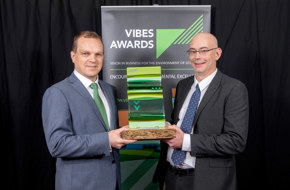Highlights
- Developed and invested in a new and innovative all in one paint and metallisation production line
- Reduction in VOC usage from 36t in 2012 to 15 tonnes in 2015.
- Wastewater from the process has reduced from 6000l to 500l.
- Increased number of parts painted from 40,000 to 70,000 using 25 litres of paint.
- Significant reduction in energy through moving to UV curing of paint resulting in drying process cost reduced by over 50%
- The quality and reliability of the painting has improved markedly, reducing scrap and wastage considerably. Scrap now 0.6% Reduced from 10 tonnes to 4 tonnes

Guala Closures Ltd manufactures bottles closures and stoppers for the whisky, spirits and wine industries. The business has four main competencies: injection moulding, aluminium pressing and forming, decoration and assembly. In 2013 the company developed and invested in a new and innovative all in one paint and metallisation production line which significantly reduce energy, VOC’s and water.
The Innovation Award recognises businesses, partnerships, collaborations or individuals within a business that have developed, innovative technologies, products, practices or services that bring environmental and business benefits. This category highlights the ability of businesses to promote sustainable consumption, reduce environmental impacts and create new business opportunities.
Guala Closures have developed an innovative way of metallising closures for drinks bottles adapting a 2D process for metallising CDs into a 3D process for their products. The innovation is integral to the company’s marketing plan – to retain and capture new high value markets by creating the best quality product. The investment and innovation in this technology has helped to secure the economic sustainability of the manufacturing plant in Scotland.
The company has a strong environmental commitment. There is a company-wide environmental policy with the Kirkintilloch site working towards ISO 14001 which it is hoping to obtain in 2017.
The production line utilises the most up to date paint technology, using airless spray guns that are pulsed, rather than conventional spray guns that are operational all the time with very poor transfer efficiency. The new spray guns operate without compressed air and can operate incredibly quickly so that each component is presented in front of the gun, rotated at high speed and sprayed with a gun opening time of 150 milliseconds. The system also
uses very high solid content UV curable paints, this means that there is no need for a conventional gas fired convection oven and that the overall footprint of the line is smaller and uses less energy.
Emissions from the line are very low with less than 50mg/m3 emitted from each spray booth. However to further lower emissions to atmosphere Guala Closures UK decided to utilise a carbon bed adsorber, the use of the carbon bed adsorber means that emissions to atmosphere have been reduced to less than 10mg/m3. Any overspray within the booth is captured and held within a container, which can be recycled to further reduce paint waste.
The full line is maintained in negative pressure and employs HEPA filtration to ensure fugitive emissions are minimal. The investment has also realised considerable financial benefits. For example, the investment is much more cost effective than the more labour intensive batch process formerly employed which was also limited in the types of products it could process.
Stuart Giles, Business Engineering & Site Services Manager, Guala Closures Ltd: “Guala Closures UK Ltd is delighted to have won this prestigious award. We are thrilled to have been recognised for the commitment we have made to reduce our impact upon the environment by implementing innovative new technologies and processes. We are proud to take our place amongst many excellent companies who are totally committed to delivering a sustainable future.
“The work we have under taken over recent years has been a signif icant investment, both by our staff and f inancially. This work will never stop as we continue to improve; not only our processes but our culture and how we impact the environment.”